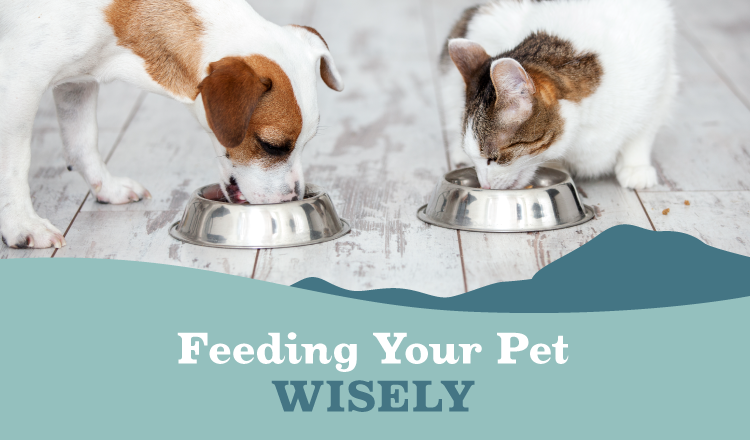
Feeding Your Pet Wisely
Ever heard the expression “you are what you eat”? Well, the same is true for our pets. A nutrition-rich diet is your pet’s first line of defense and a cornerstone of preventive care. Proper daily nutrition will go a long way in keeping your pet healthy by bolstering the immune system and supporting normal development in younger animals.
Every pet’s nutritional needs are different, based on age, breed, health conditions and lifestyle factors—which can make choosing the right pet food complicated. For example, larger breed dogs have different nutritional needs than smaller breeds, and puppies should eat much differently than most adult dogs.
A good guideline is to feed your pet the highest-quality food you can afford. Follow package instructions for how much to feed and be sure to offer plenty of fresh water as well. Canned food provides more moisture, which can be helpful in keeping small puppies and kittens hydrated and be sure to choose a food formulated specifically for kittens or puppies for as long as a year.
Feeding felines
Remember that cats are obligate carnivores–they depend entirely on meat because their diet requires nutrients that are only found in animal flesh. You may want to free-feed your kitten kibble and supplement it with small amounts of canned food in the morning and evening. As she gets older, slowly decrease the amount of food you offer her. The diet you select for your cat should help her stay healthy and strong—another reason for regular health exams that include weight measurement.
Feeding canines
Canine tooth structure and intestinal tract have become adapted to an omnivorous diet, so most dogs can meet their nutritional needs by eating a combination of plant and animal foods. The source of the proteins and fats is less important than the quality and digestibility of these essential components of the dog’s diet. While dogs can thrive on a properly balanced vegetarian diet, an all-meat diet would not meet all a dog’s nutritional requirements.
Grain-free diets
Chances are you’ve heard about the concerns regarding grain-free pet foods and their possible link to the development of dilated cardiomyopathy (DCM) in dogs. DCM can result in abnormal heart rhythms, congestive heart failure and even sudden death.
Currently, veterinary cardiologists, nutritionists and the U.S. Food and Drug Administration (FDA) are conducting a long-term study on the issue which also includes food made with legumes and exotic proteins and other atypical ingredients instead of grains to provide bulk. At this point, researchers are unsure what exactly is causing the uptick in DCM cases but feel strongly that it is diet related.
When it comes to feeding your own pets, we recommend switching from a grain-free, exotic protein, vegetarian or completely home-prepared diet. Instead, choose a commercial pet food made by a well-established manufacturer that contains common ingredients, including grains. There is no nutritional proof that a grain-free diet is better for pets—in fact, grain allergies are very uncommon in dogs and cats, who are more likely to be allergic to protein sources.
If you have been feeding your pet a grain-free diet, we also recommend that you be aware of the early signs of heart disease: weakness, slowing down, less able to exercise, shortness of breath, coughing, or fainting.
Table scraps
You’re tempted to share that piece of pizza crust with your pup, because how bad can it be? The answer is, feeding table scraps and certain kinds of human food to your pet can cause medical problems. These include obesity, inflammation of the pancreas and gastrointestinal upset (diarrhea and vomiting). Worse, they can be toxic and even kill dogs and cats.
Table scraps and human food aren’t complete and balanced nutrition for pets. Feeding them to your pet can also lead to picky eating and begging.
Feeding senior pets
Like people, our pets’ nutritional needs often change as they grow older. Changes in metabolic rate mean fewer calories are burned and more are stored as fat. Humans of a certain age can attest to that.
A recent study showed that mature dogs need 20 percent fewer calories to maintain the same weight as younger ones. That means as he grows older, your dog may benefit from eating food with less fat and fewer calories.
But as he continues to age, he may lose his appetite. At this stage, increasing the fat content of his diet can increase both taste and calorie content, and may improve protein efficiency, which is important for older dogs. That’s why senior diets should have increased protein-to-calorie ratio, providing a minimum of 25 percent of calories from protein.
A low-sodium diet may benefit dogs with heart or kidney problems, though decreasing sodium is usually a good idea for any senior. Another common problem for our older dogs happens when the cartilage surfaces of their joints begin to thin. Changing to a food with added glucosamine and chondroitin can help reduce inflammation and slow the progression of joint damage.
Older cats are more vulnerable to medical problems and disease. Cancer, kidney disease, and heart disease are the most common causes of non-accidental death in cats, but proper nutrition can help your cat live longer. Before you consider switching to a senior cat food formula, please talk to us about giving your cat a thorough physical and metabolic evaluation. Since many of the diseases commonly found in older cats can be detected early on, we can recommend the best food to help deal with medical concerns.
A senior blood panel and urinalysis can tell us a lot about your pet’s metabolic and organ health and the results can help us make diet recommendations. Some aging pets need prescription diets to keep them as healthy as possible.
At Alto Tiburon Veterinary Hospital, our veterinarians and staff can take the guesswork out of feeding your pets by advising you about what’s right for your animal. Have questions or concerns about what your pet is eating? Call us at (415)383-7700.